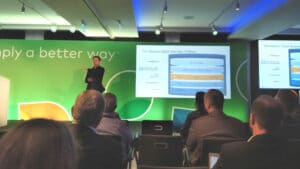
Alfresco DevCon 2019: Alfresco listening and moving forwards
Alfresco’s annual developer conference was held in the EICC in Edinburgh this year. The venue was good but the weather, as predicted, for Scotland in January was cold and snowy. My return flight was cancelled due to snow, but I got home the following day.
As expected there was lots of talk on the things delivered in the previous year, in particular the new ADF framework and Docker-based deployment. The new Alfresco Insight Server looks like an important addition that my customers need. And the transformation server has finally been split out of the Alfresco repository in 6.1, which is a well overdue piece of work.
With Docker and Kubernetes now front and centre with Alfresco deployment, and as more services are unbundled from the Alfresco repository, it is going to become harder to deploy Alfresco without an orchestration framework. AWS Quick Start and the Alfresco installer have now been discontinued since they never produced a production-ready instance of Alfresco.
One barrier for customers upgrading to Alfresco 6.0 has been the lack of SDK, and last year talking to various Alfresco product managers it was very unclear whether they were going to do anything about it. During the first session I was very pleased to hear the announcement of the new versions of SDK, so that that is one less blockage on upgrading. Thank you Alfresco for listening.
Alfresco Development Framework (ADF), the new UI framework for Alfresco, is maturing nicely and in particular the security concerns that prevented us from using it for various clients have been addressed with the introduction of the Alfresco Identity Server (AIS), a thinly re-skinned instance of KeyCloak. For existing customers there was the admission that the transition from the Alfresco Share interface is not easy so Share is still supported until at least 2022. So that’s a change of direction by Alfresco.
One of the most popular talks was David Webster’s A Path from Share to ADF, where he outlined his company’s challenges with the various different Alfresco user interfaces that had been used over the years. Starting with the startling fact that Share is 10 years old. He went through various suggestions of how to ease the pain of the transition.
The most unusual talk I heard was a Lightning Talk by Boriss Mejias discussing The Alfresco Community and the Transit of Venus. In this talk, he compared the efforts of the Alfresco community with the measurement of the distance between the earth and the sun. Explorers, like Captain Cook, measured the transit of Venus across the sun from various parts of the world. One of the points here is that it was only by people collaborating together that allowed them to get a result they were looking for.
The second day started with a QA with Alfresco’s new CEO, Bernadette Nixon. It was nice to hear of the focus and commitment to open source and collaboration, something that I feel Alfresco had not prioritised over the last few years. The technology focus of Alfresco seems to be working again. There was also a comment that Alfresco is looking again at its licensing models since per-core licensing does not make sense in the world of cloud computing.
The final session of the conference was a QA session with Alfresco’s product leadership and the audience. One interesting thread was triggered by a blog post written by Jeff Potts in January. The suggestion was that perhaps Alfresco had become a bit too much of a platform company focused upon internal development. It needed to change direction slightly and get back to implementing business features such as redaction and annotation. And I add collaborative editing to that list since that is also a common requirement that is no longer supported by Alfresco.
One thing that I expected to see was case studies of real use of Artificial Intelligence (AI). The last two Alfresco DevCon keynote sessions have discussed the opportunities for using AI with content and process management and for the last few years there has been technical demonstrations of features such as sentiment analysis. But once again this year’s DevCon had a few demos and proof of concepts, but not actual “war stories” of real use-cases.
Alfresco is changing the architecture to enable AI. In particular to split out the Event Processing so that for example it’s easy to tie in an AWS Lambda function that delegates to an AI engine and then updates metadata within Alfresco. I look forward to seeing some more examples, and perhaps I will be lucky enough to be able to present one next year!



